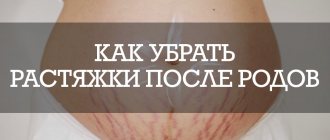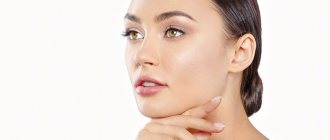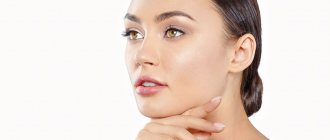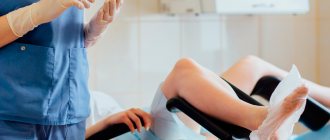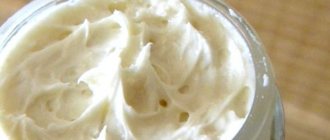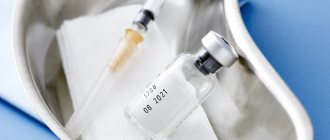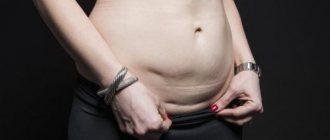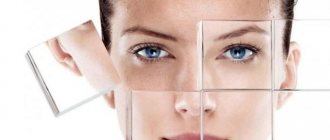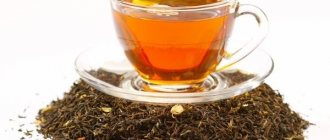Childbirth is not only a natural physiological process for any woman, but also a serious test for her body. Even during pregnancy, the body undergoes radical restructuring, which affects all systems and internal organs. Immunity is no exception; in pregnant women it is especially sensitive and vulnerable.
It is not surprising that it is during pregnancy that many expectant mothers experience allergies. And even more often, allergic reactions appear after childbirth. Is it possible to somehow prevent this or at least alleviate the condition? To answer these questions, it is important to understand what mechanisms trigger allergies immediately after childbirth.
How do postpartum allergies manifest?
If a cold allergy or another type of allergic reaction appears after childbirth, a woman can easily identify the disease by its characteristic symptoms - swelling, itching, rashes. But these symptoms are basic. Various allergic reactions are accompanied by other symptoms:
- copious mucous discharge from the nose (rhinitis);
- conjunctivitis, red and watery eyes;
- difficulty breathing, shortness of breath and bronchospasm.
Postpartum allergies should not be taken lightly. It is important to see a doctor as soon as possible. Especially if symptoms are observed in both mother and child. The lack of correct and timely treatment provokes dangerous complications - Quincke's edema and anaphylactic shock. The weakened bodies of mother and baby cannot cope with this without medical help.
Signs of hormonal imbalance
3-4 months after birth, hormonal levels gradually return to normal. During this period, it is necessary to analyze your physical well-being, emotional and mental state.
Symptoms of hormonal imbalance include the following:
- sudden mood changes;
- nervousness, a state when tears well up in the eyes by themselves;
- sudden outbursts of aggression;
- hair loss;
- feelings of guilt, painful thoughts (about the inability to be a good mother and wife, etc.);
- a sharp jump in weight (lack or excess);
- pathological suspiciousness;
- depressed mood;
- problems with breastfeeding, including lack of milk;
- reluctance to breastfeed;
- painful menstruation;
- acne;
- hyperpigmentation;
- decreased libido.
If these symptoms occur, you should consult your doctor.
Allergies after childbirth in a mother: what to do?
First of all, quickly diagnose and then treat correctly. When breastfeeding, it is important to select certain antihistamines and strictly follow the recommendations of doctors. In most cases, complex therapy quickly overcomes allergies and allows the young mother to return to normal life.
A comprehensive examination of the body will help determine the causes and type of allergies:
thorough examination of internal organs and systems;- blood and urine tests, biochemical examination;
- Ultrasound of the abdominal organs, examination by a gastroenterologist;
- blood test for immunoglobulins and the presence of antibodies;
- Prick tests are the safest, most convenient and easiest to perform.
It is better to examine your body before pregnancy or at least before the birth of the child. But if it happens that the child has already been born and postpartum allergies have begun in both mother and baby, you cannot waste valuable time. It is important to examine the newborn as well – perhaps the child’s allergies after birth are caused by external factors.
Why does hormonal imbalance occur after childbirth?
Childbirth itself is already a cause of hormonal imbalance. But recovery may take longer for the following reasons:
- difficult childbirth;
- lack of milk;
- illnesses suffered in the first months after childbirth;
- stress;
- drug use;
- unbalanced diet;
- smoking, alcohol consumption.
A woman wants to quickly return to her old life, so she often harms her body by not giving it time to recover. Thus, mothers who immediately after childbirth go to work, start smoking or go on a strict diet, dreaming of saying goodbye to the extra pounds gained during pregnancy, are at risk.
Another situation is also possible. The woman devotes all her strength to the child, eats and sleeps poorly, practically does not rest, is nervous, neglects self-care (which can also cause acne).
How to alleviate the condition and recover faster?
Simple recommendations will help:
- A pregnant woman and a young mother should carefully monitor the nutrition and condition of the digestive system. Don't experiment with your diet. It is better to give up something unusual - this will minimize the risk of postpartum allergies and other problems.
- It is important to limit contact with possible allergens. Do not walk in a stuffy city near flowering plants, regularly wet-clean your home with eco-friendly and hypoallergenic products, wear clothes made from natural fabrics, avoid decorative cosmetics, and take a shower daily.
- Get enough sleep and avoid stress, remember about feasible physical activity. Hiking, yoga for pregnant women, daily exercises, a short vacation at the seaside or in the mountains will make pregnancy easier and reduce the risk of postpartum allergies for both the young mother and her baby.
Taking your body seriously during pregnancy, following doctors' recommendations, using safe antihistamines such as Fenkarol, and conscious prevention are the best helpers in the fight against allergies after childbirth. Remember this and be healthy!
Acne
Against the background of hormonal imbalance, sebum production may increase, which is a provoking factor for the appearance of acne* after childbirth; only a dermatologist can tell you how to get rid of acne. When drawing up a course of treatment, the doctor takes into account that the woman is breastfeeding. During lactation, many drugs are contraindicated.
cl1
If acne appears when a woman is no longer breastfeeding, topical and systemic medications may be prescribed. Thus, for mild to moderate acne, external antibiotics can be prescribed, for example, Clindovit®6,18. Its main active ingredient is clindamycin phosphate6. The drug exhibits antibacterial activity against propionibacteria and reduces the level of free fatty acids6.
It is recommended to use Clindovit® gel together with azelaic acid (for example, Azelik® gel) and benzoyl peroxide to reduce the risk of antibiotic resistance28.
Why do acne appear?
The main hormones that govern almost all processes associated with childbirth are progesterone and estrogen. During certain periods of life, their production increases sharply. They, in turn, increase the secretion of sebum, which, unable to reach the surface of the skin, “gets stuck” in the follicles. Outwardly, it looks like small white pustules filled with a hard fatty ball.
Dermatology and endocrinologists treat them.
How to get rid of acne?
Treatment tactics in this case will greatly depend on whether the woman is breastfeeding or not. If the baby is bottle-fed or has already grown enough, then the woman is prescribed low-dose hormonal contraceptives, which gently stabilize hormonal levels. In some cases, it is sufficient to use local hormonal drugs that are applied directly to the affected areas.
If a woman is breastfeeding, such treatment is contraindicated for her. Accordingly, you will have to take a wait-and-see approach and resort to non-aggressive methods of therapy:
- Clean your shoulders regularly twice a day with a gentle cleanser.
- Moisturize the skin with a soft non-comedogenic cream.
- Regularly make compresses from decoctions of medicinal plants. Those in which the baby is bathed every day are perfect.
- When choosing clothes, it is better to give preference to natural fabrics, as well as styles that do not pinch this part of the hand.
- It is highly advisable to limit the consumption of sweets and rich foods, which significantly contribute to the appearance of new pimples.
Treatment and prevention
Well, okay, we found out the reasons why the face became covered with acne after childbirth, but what to do about it, how to get rid of them at home?
If the main role in the appearance of rashes was played by a hormonal factor - a drop in progesterone concentration, then this physiological feature does not require any therapeutic measures other than normal daily hygiene. After some time, the skin will recover from hormonal fluctuations and the intensity of the rash will disappear on its own. Typically, an indicator of restoration of hormone balance is a return to a normal menstrual cycle. When a child is bottle-fed, this occurs approximately 2–3 months after birth, and when he is gradually transferred to complementary foods, this occurs at 6–8 months.
Important! The most important thing that you absolutely cannot do is interfere with the functioning of the endocrine system. The author of these lines has seen young mothers, overly concerned about their own appearance, who, having learned about the “cosmetological effect” of progesterone, continued to take self-prescribed medications with this hormone after pregnancy. Yes, their skin looked good, and their acne disappeared, but along with them, their breast milk completely disappeared, and the restoration of normal hormonal levels then took more than one month.
What can you do on your own?
If you want to speed up the skin restoration process and get rid of acne faster, then you need to start with changes in your lifestyle:
1. Inspect your menu and exclude the products described above from it. It may be helpful to consult with a professional nutritionist. He will tell you how to properly balance your diet for all the main components, how to avoid insufficiency of water and bioactive substances, and how to build a nutritional plan that is beneficial not only for you and your skin, but also for your child.
2. Particular attention should be paid to sufficient intake of vitamins and microelements. They are important and necessary for both the mother and the baby, who will receive them from breast milk. At the same time, such supplements will ensure the health of a woman’s skin. We talked in detail about how vitamins and microelements affect the appearance of skin and hair in another article on our blog. What vitamin preparations should I take? Talk to your doctor for advice on the best options. But even if you just continue taking the supplements that were prescribed to you during pregnancy, this will be a great option.
3. Maintain personal hygiene carefully. Regardless of the child’s character and behavior, try to allocate at least a little time for yourself. Remember that this will not only help the acne disappear, but also keep your baby healthy. An important point - avoid using products with an intense scent and cosmetics that remain on the skin for a long time. A baby definitely doesn’t need such “flavoring and aromatic additives”.
4. Avoiding stress and “emotional swings” after childbirth is quite difficult. But try to at least minimize such mental stress. Psychological support from family and relatives will be especially important here. By the way, this recommendation is very strongly related to the previous one, because self-care and cosmetic procedures aimed at improving your appearance are quite calming, adding positivity and a good mood.
5. Try not to neglect your daily walks. This is especially true for the warm season. Several positive factors converge here: • positive effect of fresh air on the skin; • the healing effect of moderate solar radiation (a light tan will only be useful for getting rid of acne!); • eliminating the deficit of physical motor activity; • and finally, the wonderful effect of walking on the baby's health.
6. If you can find enough time, go to a beauty salon, where they perform hardware cleansing of the skin. The safest option would be to use laser technology. Light radiation effectively fights infectious agents that cause acne, and at the same time does not introduce any foreign substances into the woman’s body that could harm the child.
Pharmacological treatment
Important! Any drugs, even for external use, can be used only after consultation with a pediatrician , who must assess their effect on the child’s health.
Will acne on the face and body go away on its own after childbirth? With a high probability - yes. But this process can be accelerated. In the classical version, medical treatment of such disorders consists of three components: 1. Finding and getting rid of the cause of increased production of sebum by the sebaceous glands. 2. Destruction of pathogenic microflora that is already growing and developing in the elements of the rash. 3. Reducing the severity of the inflammatory reaction.
We fight the reason
In order to effectively and, most importantly, safely treat acne for a child, you should first consult with an allergist, dermatologist and endocrinologist. If the cause of the rash is hormonal, then a competent doctor will skip the first point of the classical scheme given above. As we have already said, in order to get rid of acne as quickly as possible, it is extremely unwise to interfere with the balance of hormones. In other cases, lifestyle adjustments will become the basis of your treatment.
Fighting infection
To destroy infectious microorganisms, local antiseptic agents should first be used. For example, a solution of salicylic acid has this effect, which should be used to wipe the face and other problem areas after each wash. It’s even better if your antiseptic has both antimicrobial and drying properties. For example, zinc preparations are characterized by a similar set of qualities - they simultaneously reduce the activity of the sebaceous glands of the skin and help destroy pathogenic bacteria.
More pronounced results in the fight against infection are demonstrated by specialized antibiotic drugs. They are usually prescribed after inoculating microflora isolated from the contents of acne. During this analysis, the resistance of a particular strain of bacteria to certain drugs is assessed. And based on the results of the examination, the woman is recommended the drug that will be most effective for her.
You need to start with topical use of antibiotics in the form of ointments, gels or powders. Systemic administration of such drugs with food or their intravenous/intramuscular administration is extremely undesirable, since almost all of these drugs can easily pass into breast milk. To prescribe such therapy, the attending physician must have very compelling reasons, for example, the threat of developing a generalized infection - sepsis. Of course, banal acne on the skin is not such an indication.
Fighting inflammation
This stage has primarily a cosmetic meaning. If we have successfully dealt with the cause of acne by reducing the activity of the sebaceous glands, and then got rid of pathogenic microflora on the skin, then its reactions (redness, swelling, etc.) will sooner or later subside on their own. Therefore, the use of anti-inflammatory drugs is not mandatory. But this will significantly speed up the return to the normal appearance of the skin.
Remember that some medications in this group can also be excreted in breast milk and may harm the baby's health. Therefore, before using them, you should definitely consult your doctor. The list of anti-inflammatory drugs is very large and a specialist will recommend you those that will be completely safe for the baby.
Why do they arise?
A whole class of progestogen hormones is largely responsible for the normal course of pregnancy and the successful bearing of a child. Their name is precisely derived from the Latin term “gester”, which translates as “gestation”. Progesterone is one of the most prominent representatives of this class. Under its influence, the uterus is prepared for implantation, its contractility decreases (which is important for the prevention of miscarriages), lactation in the mammary glands is inhibited, and so on.
But besides all this, one of the side effects of progesterone is a positive effect on the skin. At high concentrations of this hormone, the blood supply to the skin is activated, the hair structure improves, and more collagen and elastin are produced - the main structural proteins on which the smoothness and elasticity of the skin depends. It is the effect of progesterone that explains the fact that many pregnant women quickly notice how their skin has become prettier and younger.
Unfortunately, this cosmetic effect of progesterone does not last forever. With a normal end of pregnancy, immediately after childbirth, its concentration in the blood begins to decrease. This allows the uterus to contract and return to its normal size, and in the mammary glands, now under the influence of another hormone - prolactin - milk begins to be intensively produced.
But at the same time, this kind of “hormonal support” for the beauty and health of the skin ends. In particular, a decrease in the concentration of progesterone leads to the fact that the fatty secretion secreted by the sebaceous glands becomes denser and thicker. Consequently, sebum can no longer be easily released from the pores, clogs them and provides an excellent environment for the development of pathogenic microorganisms with the formation of inflammatory elements. This is precisely the answer to the question of why acne appears on the cheeks and other parts of the body after childbirth.
Are there other reasons?
Yes, although progesterone plays a decisive role, a number of other provoking factors can also contribute to the appearance of rashes:
1. Quite often, after giving birth, a woman begins to rapidly gain weight. For those who are not used to living in a different weight class, this can pose a problem not only from an aesthetics point of view, but also from a hygiene point of view. Increased body weight is always associated with increased sweat production and rapid skin contamination, especially in the area of natural folds. Therefore, greater attention needs to be paid to hygiene procedures.
2. Another hygienic factor that leads to the appearance of rashes echoes the previous reason - a young mother (especially if this is her first child) may simply not have enough time to take care of herself. What to do if acne breaks out after childbirth, and you don’t have time to wash your face again? There is only one answer - you need to find a break for hygiene! Moreover, simple treatment of the face and body will take little time and you can ask relatives to be with the child at this moment. The importance of this event is not even that it will contribute to the return of your normal appearance, but that the purulent contents of acne include pathogenic microorganisms that can be dangerous for a child.
3. Deterioration of blood supply to the skin. A forced reduction in a woman’s physical activity can lead to such unpleasant consequences. After all, she sits at home with the child almost all day, rarely goes out and spends little time in the fresh air.
4. Dietary disorders. Often after childbirth, the mother develops taste preferences and wishes that are unusual for her. In this aspect, according to neonatologists, you should not follow your own body’s lead. Avoid sweets, baked goods, as well as aggressive foods - smoked foods, pickles, fried and fatty foods. All of them contribute to the appearance of acne. The main place in a young mother's diet should be dairy products, fresh vegetables and fruits (but not allergenic!), dark breads, soups and lean meats. In addition to the positive effect on skin condition, a balanced diet will have a beneficial effect on both breast milk production and the baby’s health.
5. Failure to comply with the drinking regime. Breastfeeding requires increased fluid consumption by the mother's body. And this need is imperative - if there is not enough water for the synthesis of breast milk in the mammary glands, it will be taken from other organs and systems. The skin is one of the first to suffer from such a moisture deficiency. It becomes drier, and therefore much more susceptible to infectious agents. Therefore, when deciding what to do if after giving birth your face is covered with acne, first ask yourself: do you drink at least 2 liters of clean water a day? And if not, be sure to adjust your drinking regime.
6. Psycho-emotional disorders. It is no secret that pregnancy, childbirth, caring for a baby and breastfeeding greatly influence not only the physiology, but also the psyche of a woman. She becomes more labile, more sensitive to previously seemingly insignificant factors. Constant stressful situations, depression, lack of sleep and physical activity - all this worsens skin health and can lead to rashes.
